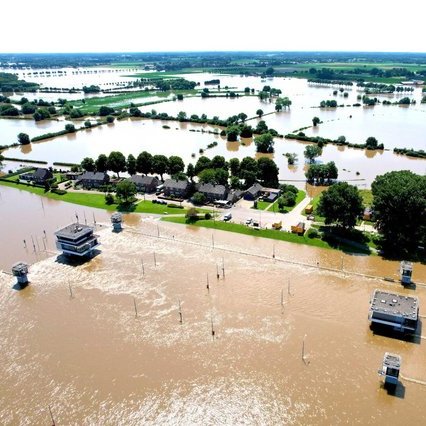Theme IV: Climate governance
The climate challenge cannot be solved in one country or one part of the world. We need to develop technologies and solutions that can be utilised worldwide, tailored to specific local circumstances. These changes bring forth questions like what is the best technical solution for a specific context? Who will profit and who will not, and how should we deal with that? How can we make sure the energy transition is fair and inclusive? What policies do we need to make the solutions sustainable?
It requires forward-looking governance and planning, able to deal with structural uncertainties to guide government and public in making informed trade-offs between a wide range of technical, ecological, economic, ethical and social consequences.

Flagship project
Next generation of IAMs to ethically inform decision support

Integrated Assessment Models (IAMs) are central in informing global climate change policy, for instance through IPCC assessments. We will contribute to the development of the next generation of IAMs by improving the realism of behavioral and transition dynamics of these models, with a particular emphasis on climate ethics and uncertainty quantification. Open challenges that the IAM community faces require a rigorous knowledge of the field and an ambition to bring it forward by developing novel methods.
Flagship team
Jan Kwakkel
Jazmin Zatarain Salazar
Neelke Doorn
Behnam Taebi,
Servaas Storm
Stefan Pfenninger
Tatiana Filatova
Adrien Poujon (PhD)
Giacomo Marangoni (Academic Career Tracker)
Flagship project
Behavioral Design for Climate Action

To address climate change and encourage the adoption of climate responsible behaviours, communities of end users need to be engaged. Yet, often individuals act according to their short-term best interests, for instance, using unsustainable products or practicing behaviors that hinder achievement of climate goals. Design research plays a vital role by engaging users at the community level, and creates awareness of common resources, sense of community and joint efforts required for a successful climate action. We will focus on understanding how climate-resilient communities are shaped, given the interrelationships formed by common resources. And in this way contribute to the fundamental design knowledge and methods for understanding and shaping climate actions at the community level. Given the increasing complexity of multi-actor systems, there is a need to further develop field-based methods, like Living Labs, to provide insights that foster interactive designs, enable user-centric testing of assumptions and iterative redesign leading to an increased adoption of interventions for climate-aware behavior. An understanding of the social, cultural, economic, and ethical values of relating to climate action will be valuable here.
Flagship team
David Keyson
Erik Schoorlemmer
Ingrid Mulder
Ruth Mugge
Abhigyan Singh
Mert Akay (PhD Candidate)
Flagship project
Environmental Psychology and Simulation

Climate action demands drastic behavioural and social changes for a variety of actors. Success of technological interventions climate change mitigation and adaptation policies critically depends on our understanding of drivers of citizens’ behavior, including psychological biases, individual preferences, and social influence. We will integrate and advance behavioural insights for effective climate policy design, communication and compliance concerning climate change mitigation and adaptation through (computational) modelling and empirical analysis.
Flagship team
Gerdien de Vries
Emile Chappin
Lisa Scholten
Patricia Osseweijer
Geeske Scholz (Academic Career Tracker)
Flagship project
Climate Finance for climate resilient infrastructure

Climate finance is at the heart of many climate change policy proposals such as the Glasgow Climate Part, Paris agreement, the obligatory disclosure of climate risks for governments and companies, etc. It is about mobilizing financial resources aimed at stimulating adaptation to and mitigation of climate risks. Climate change and finance impact all infrastructure decisions, including clean energy investments, green mobility, phasing out fossil fuel systems, climate-resilience of exisiting and new urban development, and climate-proofing infrastructure investments in general. Yet, little is known about how finance shapes the evolution of infrastructures and resilient urban systems.
We will use data-driven approaches to understand how climate finance shapes the evolution of regional and urban infrastructure and networks, their vulnerability and exposure to climate risks. From there, climate finance instruments can be designed to efficiently and effectively achieve resilience to climate change across different countries, regions and infrastructures. Based on this analysis, we will unpack trade-offs and choices that need to be made in climate finance policies. By blending climate finance data with data on infrastructure and urban evolution and resilience, new data driven methods will be developed to determine how climate finance shapes the growth and resilience of infrastructure networks, cities and regions. This will ensure that the tremendous investments in climate adaptation and mitigation are used in the most efficient and effective way.
Flagship team
Tina Comes
Nazli Aydin
Samantha Copeland
Neelke Doorn
Ellen van Bueren
Zac Taylor
Chris Zevenbergen
Theodoros Chatzivasileiadis Academic Career Tracker
Flagship project
Modelling Future Deltaic Systems

Climate change is projected to increase both the frequency and severity of floods, storms, and droughts in deltaic water systems, where the coastal, riverine and regional/urban water systems co-evolve and interact with spatial development patterns . This flagship focuses on improving the understanding of these systems, including the urbanized landscape and infrastructure, under climate change. The focus is on an integrated and interdisciplinary approach to three challenges: (1) combining data and modeling tools (possibly using the DelftBlue supercomputing facilities), (2) developing adaptive design methods and insight in interventions, including nature-based designs and territorial/land-use planning, (3) supporting multi-actor decision making and management through many-objective optimization and evaluation of specific strategies and interventions, both for operational use (real-time, early warning) and long-term planning, under deep uncertainty.This flagship focuses on (1) and (3) and thus will bridge data with analysis in the fields of hydraulic engineering and water management.

![[Translate to English:] [Translate to English:]](https://filelist.tudelft.nl/_processed_/2/e/csm_HomeDam_6e8e924026.jpg)
![[Translate to English:] [Translate to English:]](https://filelist.tudelft.nl/_processed_/d/4/csm_PWE%20Basics_b82450a405.png)
![[Translate to English:] [Translate to English:]](https://filelist.tudelft.nl/_processed_/7/b/csm_Foto9_7c2a6e8460.jpg)
![[Translate to English:] [Translate to English:]](https://filelist.tudelft.nl/user_upload/Youtube-banner-1024-200x113.jpg)